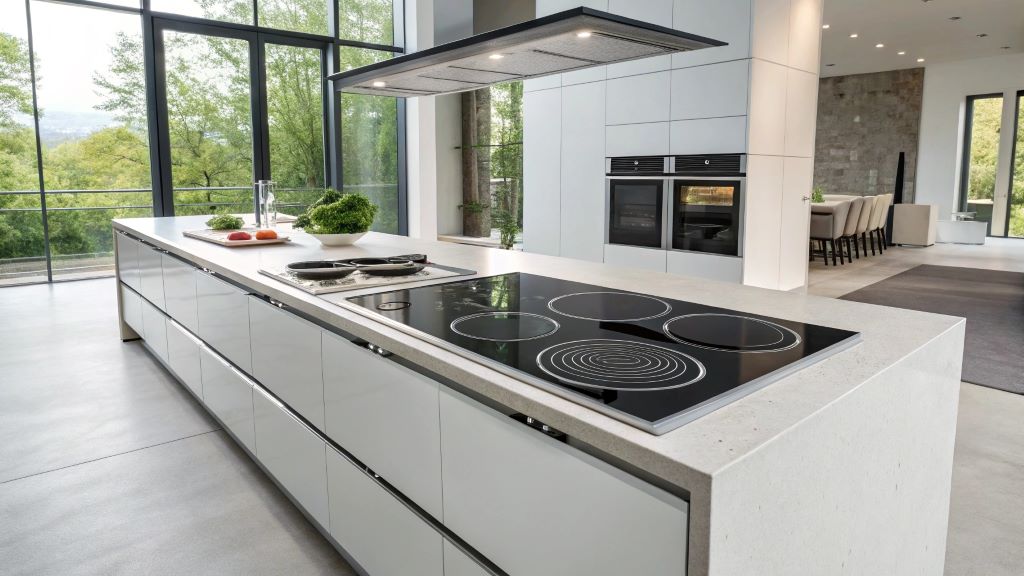Revolutionize Your Kitchen: Cutting-Edge Cooktop Technologies Explained
Modern cooking has evolved dramatically over the past decade. Today’s kitchen enthusiasts demand more than basic functionality from their appliances. They seek efficiency, precision, and innovative features that transform everyday cooking into a culinary adventure. The experts at The Funky Kitchen understand this evolution and continue to showcase the latest trends in kitchen technology.
Contemporary cooktop technologies offer unprecedented control over cooking processes. However, investing in advanced equipment requires understanding proper care techniques. Learning how to maintain kitchen appliances ensures your investment delivers optimal performance for years to come.
The landscape of cooktop technology has transformed significantly. Furthermore, manufacturers continue pushing boundaries with smart features and energy-efficient designs. Therefore, understanding these innovations helps homeowners make informed purchasing decisions.
Induction Cooktops: The Future of Cooking
Induction technology represents one of the most significant advances in cooking methods. These cooktops use electromagnetic fields to heat cookware directly. Consequently, the cooking surface remains relatively cool while delivering precise temperature control.
Energy efficiency stands as induction cooking’s primary advantage. Additionally, these units heat food faster than traditional gas or electric cooktops. The electromagnetic field responds instantly to temperature adjustments. Therefore, chefs enjoy unprecedented control over their cooking process.
Safety features make induction cooktops particularly appealing to families. The cooking surface stays cool during operation. Furthermore, most models automatically shut off when cookware is removed. However, induction cooking requires magnetic cookware for proper function.
Smart Cooktops: Connected Kitchen Solutions
Internet-connected cooktops bring automation to home cooking. These devices integrate with smartphone apps and smart home systems. Moreover, they offer features like remote monitoring and automatic temperature adjustments.
Voice control capabilities enhance the cooking experience significantly. Users can adjust temperatures and set timers without touching controls. Additionally, some models provide guided cooking assistance through connected apps. Therefore, even novice cooks can achieve professional results.
Smart diagnostics help identify potential issues before they become problems. The system monitors performance and alerts users to maintenance needs. Furthermore, software updates continuously improve functionality and add new features.
Hybrid Cooking Systems: Best of Both Worlds
Hybrid cooktops combine multiple heating technologies on one surface. These systems typically feature both induction zones and traditional gas burners. Consequently, cooks enjoy maximum flexibility in their cooking methods.
Professional chefs often prefer hybrid systems for their versatility. Gas provides visual flame control for certain techniques. However, induction zones offer precise temperature control for delicate sauces. Therefore, hybrid systems accommodate various cooking styles within one appliance.
Installation flexibility makes hybrid cooktops attractive to many homeowners. They work in kitchens with existing gas lines while offering electric cooking zones. Additionally, the dual-fuel approach provides backup cooking methods during utility issues.
Advanced Temperature Control Features
Precision temperature control has become a standard expectation in modern cooktops. Many units now offer degree-by-degree temperature adjustments. Furthermore, some models maintain exact temperatures automatically throughout the cooking process.
Sous vide functionality appears in high-end cooktop models. These features maintain water baths at precise temperatures for extended periods. Additionally, slow-cooking modes provide gentle, consistent heat for delicate preparations. Therefore, home cooks can achieve restaurant-quality results.
Temperature probe integration allows monitoring food temperatures directly. The cooktop adjusts heat based on internal food temperature readings. Moreover, preset programs handle complex cooking techniques automatically.
Energy Efficiency and Environmental Impact
Modern cooktops prioritize environmental responsibility through improved efficiency. Induction models typically use 85-90% of generated energy for cooking. Conversely, traditional gas cooktops only achieve 40-45% efficiency rates.
Reduced heat waste benefits both energy bills and kitchen comfort. Efficient cooktops generate less ambient heat during operation. Furthermore, improved insulation and heat management reduce cooling costs. Therefore, homeowners save money while reducing environmental impact.
Some manufacturers now offer carbon-neutral cooktop options. These models offset manufacturing emissions through renewable energy programs. Additionally, recyclable materials and extended warranties reduce environmental impact over the appliance’s lifetime.
Installation and Integration Considerations
Professional installation ensures optimal performance from advanced cooktop technologies. Electrical requirements vary significantly between different models. Moreover, proper ventilation becomes crucial with high-performance cooking equipment.
Kitchen design integration requires careful planning for modern cooktops. Smart models need reliable Wi-Fi connections for full functionality. Additionally, some units require dedicated electrical circuits or gas line modifications. Therefore, consulting professionals during planning prevents costly installation issues.
Counter space and ventilation planning affect cooktop selection significantly. Larger units provide more cooking zones but require adequate surrounding space. Furthermore, powerful cooktops generate more heat and cooking vapors, necessitating upgraded ventilation systems.

Maintenance and Longevity Tips
Regular cleaning maintains both appearance and performance of modern cooktops. Different technologies require specific cleaning approaches and products. However, consistent maintenance prevents buildup that can affect functionality.
Induction cooktops benefit from regular glass surface cleaning with appropriate products. Avoid abrasive cleaners that can scratch the surface. Additionally, ensure cookware bottoms remain clean to maintain efficient heat transfer.
Smart features require occasional software updates for optimal performance. Most units handle updates automatically when connected to Wi-Fi. Furthermore, regular system diagnostics help identify potential issues early.
Cost Considerations and Value Analysis
Initial investment varies significantly across different cooktop technologies. Basic induction models start around moderate price points, while advanced smart cooktops command premium pricing. However, energy savings and enhanced functionality often justify higher costs over time.
Installation costs depend on existing kitchen infrastructure and chosen technology. Induction cooktops may require electrical upgrades in older homes. Conversely, hybrid systems might need both electrical and gas line modifications. Therefore, budgeting should include professional installation expenses.
Long-term value includes energy savings, maintenance costs, and appliance longevity. Efficient models reduce utility bills while advanced features enhance cooking experiences. Additionally, quality construction and warranties protect the investment over many years.
Future Trends in Cooktop Technology
Artificial intelligence integration represents the next frontier in cooktop evolution. AI systems learn user preferences and cooking patterns over time. Furthermore, predictive algorithms suggest optimal cooking methods based on ingredients and desired outcomes.
Augmented reality features may soon guide users through complex cooking techniques. Visual overlays could display temperature zones and timing information directly on the cooktop surface. Additionally, integration with smart home ecosystems continues expanding functionality possibilities.
Sustainable technology development focuses on reducing environmental impact further. Manufacturers explore renewable energy integration and improved recyclability. Moreover, extended product lifespans through modular designs and upgradable components become increasingly important.
Conclusion
Modern cooktop technologies offer unprecedented opportunities to revolutionize home cooking experiences. Induction systems provide efficiency and precision, while smart features add convenience and control. Hybrid solutions offer flexibility for diverse cooking styles, and advanced temperature control ensures consistent results.
However, success with these technologies requires proper installation, maintenance, and understanding of their capabilities. Energy efficiency benefits both environmental impact and household budgets. Furthermore, the investment in quality cooktop technology pays dividends through enhanced cooking experiences and long-term performance.
Therefore, homeowners should carefully consider their cooking needs, kitchen infrastructure, and budget when selecting modern cooktop technologies. The right choice transforms everyday meal preparation into an enjoyable, efficient process that enhances both cooking skills and kitchen functionality.
Frequently Asked Questions
What type of cookware works best with induction cooktops?
Induction cooktops require magnetic cookware made from materials like cast iron, carbon steel, or magnetic stainless steel. Test cookware by holding a magnet to the bottom – if it sticks strongly, it will work with induction. Aluminum, copper, and non-magnetic stainless steel cookware won’t function on induction surfaces without a magnetic adapter disk.
How much energy do modern cooktops save compared to older models?
Modern induction cooktops achieve 85-90% energy efficiency compared to 40-45% for traditional gas ranges. This translates to approximately 50% energy savings for cooking tasks. Smart features like precise temperature control and automatic shut-off functions further reduce energy consumption by preventing overheating and unnecessary operation.
Do smart cooktops require special internet connections or apps?
Most smart cooktops connect through standard home Wi-Fi networks using 2.4GHz or 5GHz frequencies. Manufacturers provide dedicated smartphone apps for iOS and Android devices. However, basic cooking functions remain available without internet connectivity. Strong Wi-Fi signal strength near the cooktop ensures reliable smart feature operation.
What maintenance differences exist between cooktop technologies?
Induction cooktops require gentle glass surface cleaning with non-abrasive products and regular cookware bottom maintenance. Gas cooktops need burner cleaning and occasional gas line inspections. Smart cooktops benefit from software updates and occasional diagnostic checks. All modern cooktops last longer with regular cleaning and professional annual maintenance.
Can existing kitchens accommodate new cooktop technologies without major renovations?
Many modern cooktops fit standard cutout dimensions, allowing direct replacement of older models. However, induction and smart cooktops may require electrical upgrades or dedicated circuits. Hybrid systems might need both electrical and gas modifications. Professional assessment of existing infrastructure helps determine installation requirements and costs before purchase.
Read More:












Post Comment